|
|
|
Sort Order |
|
|
|
Items / Page
|
|
|
|
|
|
|
| Srl | Item |
| 1 |
ID:
162412
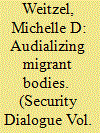

|
|
|
|
|
| Summary/Abstract |
Sound represents a salient yet rarely examined counterpoint to visuality and materiality in security, international bordering, and mobility literature. Using the context of sub-Saharan African migration as grounding for empirical analysis and drawing on fieldwork conducted in Morocco in 2015 and 2016, this article lays the foundation for a research agenda that understands voice, and the sonic body more broadly, as mechanisms of political power. In examining the central roles that sound, hearing, and voice play in strategies of individual resistance at border crossings, as well as in state, private, and transnational communication and surveillance regimes, it attends to the ways in which sound and the audialized body reconfigure power relations, and structure mobility and personal identity. This analysis contributes to the growing literature addressing biometric borders and the deterritorialization of security practices, and argues that sound, along with more familiar nodes of securitization, constitutes a critical site of governmentality and therefore of ethical and moral negotiation.
|
|
|
|
|
|
|
|
|
|
|
|
|
|
|
|
| 2 |
ID:
162414
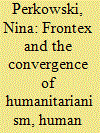

|
|
|
|
|
| Summary/Abstract |
While there has been growing scholarly interest in the convergence of humanitarianism and security in contemporary EUropean border governance, much of the existing literature has neglected the role of human rights in this process. Drawing on in-depth interviews with Frontex officials, this article takes the simultaneous portrayal of the agency as rescuer of migrants at sea, promoter of fundamental rights and defender of EUropean citizens against migrant threats as a starting point to rethink the relationship of humanitarianism, human rights and security in the governing of EUropean borders. Conceptualizing them as discourses of protection that render their subjects vulnerable in various ways, the article contributes to a deeper understanding of the connections and combined effects of humanitarianism, human rights and security in EUropean border governance. Finally, it shows that Frontex’s positioning in humanitarian, human rights and security terms has strengthened the agency in three ways. First, it has allowed Frontex to cooperate with a range of actors in ‘managing’ EUropean borders. Second, it has enabled the agency to become a ‘go-to’ solution to diverse crises in border governance. Third, it has allowed Frontex officials to shift blame for human rights abuses to member-states.
|
|
|
|
|
|
|
|
|
|
|
|
|
|
|
|
| 3 |
ID:
162413
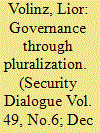

|
|
|
|
|
| Summary/Abstract |
Security responses increasingly involve the delegation of security roles from state actors, such as the police and the military, to a plurality of public and private institutions. This article focuses on the emergence of a modular governance logic in security provision, in which urban security is diffused into differing modules – security actors, performances, technologies and practices – which can be enlisted, deployed, instructed, entwined, detached and withdrawn at will. This article identifies three features of urban modular security provision: the heterogeneity of its public and private components, the development of reserved capacities, and the differential multifacetedness of its performances and practices. These are explored through the case study of East Jerusalem, in which a modular security provision emerged where previously undefined and ad-hoc security arrangements became cohesive, normalized and codified through practice and law. In tracing the flows of security authorities, personnel and knowledge produced within a modular security assemblage, this article proposes that the modular assembly of security actors complements policing institutions by providing other informal disciplinary, punitive and statecrafting powers, in a manner which obfuscates controversial state policies and unequally distributes rights and resources.
|
|
|
|
|
|
|
|
|
|
|
|
|
|
|
|
| 4 |
ID:
162415
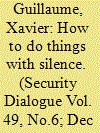

|
|
|
|
|
| Summary/Abstract |
This contribution offers the first steps in a novel conceptualization of how international relations and security studies can provide an analytics of silence. Starting with an analysis of a paradigmatic use of silence in the field, Lene Hansen’s ‘Little Mermaid’, the contribution shows the limitations and issues with an analytics that concentrates on the meaning behind silences. Silence as meaning is problematic because analytically what is offered solely is the overinvestment of the analyst’s ‘horizon of expectation’ upon a sign that is not generally meant to be one. Mobilizing a feminist reading of pornography as speech act, the contribution shows how silence may also be performative, in the sense that it does something to a specific logocentric order at the heart of our analysis of the international or security. The contribution finally offers a possible way of thinking about silence as doing rather than meaning and shows how this can be a possible analytical path to invert our analytics of the international and security from the perspective of the state/the powerful to that of the subaltern.
|
|
|
|
|
|
|
|
|
|
|
|
|
|
|
|
| 5 |
ID:
162416
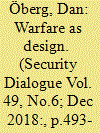

|
|
|
|
|
| Summary/Abstract |
This article argues that the politics of contemporary Western warfare finds an important reference point in discourses on military design. In the 2010s, military design has become a trending topic in military discourses on command and planning methodology. Since Clausewitz, warfare has been considered a phenomenon characterized by a tension between creativity and linear planning, and the ideal commander as someone with the vision to overcome this. By mapping and analyzing tactical, operational, and strategic narratives and practices, the article illustrates how they emphasize a warfare based both on experimentation and artistry and on traditional operational planning. In so doing, military design relies on reductive military concepts to push the tension identified by Clausewitz towards its extreme end-point, idealizing creativity as an objective of warfare. The article ends by asking to what extent military design risks spilling over into other dimensions of social and political life. It concludes that in pushing creativity as part of war, military design builds on and justifies transgressive political practices with the risk of becoming a vital aspect of future governing.
|
|
|
|
|
|
|
|
|
|
|
|
|
|
|
|
|
|
|
|
|